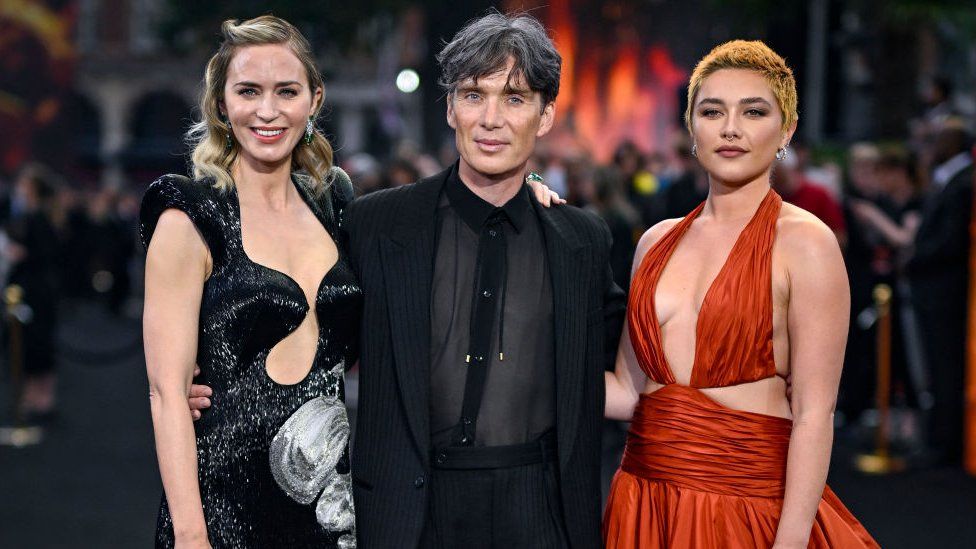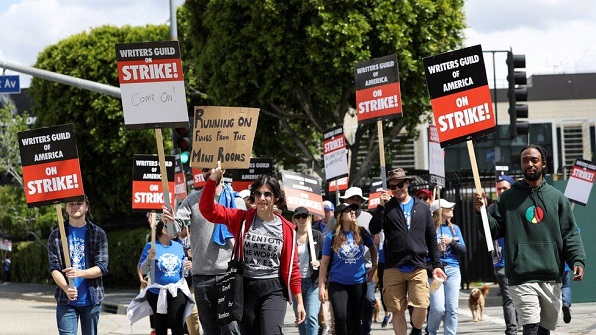Hollywood actors have joined a strike by screenwriters in the industry's biggest shutdown for more than 60 years.
Some 160,000 performers stopped work at midnight in Los Angeles, bringing to a halt most US film and TV productions.
The Screen Actors Guild (SAG) wants streaming giants to agree to a fairer split of profits and better working conditions.
It also wants to protect actors from being usurped by digital replicas.
The union is seeking guarantees that artificial intelligence (AI) and computer-generated faces and voices will not be used to replace actors.
While the strike lasts, actors cannot appear in films or even promote movies that they have already made.
As a result, stars Cillian Murphy, Matt Damon and Emily Blunt left the premiere of Christopher Nolan's Oppenheimer in London on Thursday night as the strike was declared.
The film's director, Christopher Nolan, told the cinema audience that they were "off to write their picket signs", adding that he supported them in their struggle.
Several actors took to Instagram to voice their support for the strike, including Better Call Saul star Bob Odenkirk, Sex and the City's Cynthia Nixon and Hollywood veteran Jamie Lee Curtis.
Picketing will begin on Friday morning outside the California headquarters of Netflix, before moving on to Paramount, Warner Bros and Disney.
To address concerns about the use of AI, the big studios have offered what they call a "ground-breaking proposal" that would protect the digital likeness of actors and require their consent when digital replicas are used in performances, or alterations are made.
But the union rejected the offer, made by the Alliance of Motion Picture and Television Producers (AMPTP).
The SAG's national executive director and chief negotiator, Duncan Crabtree-Ireland, said it was unacceptable.
"They propose that our background performers should be able to be scanned, get paid for one day's pay, and their company should own that scan of their image, their likeness, and should be able to use it for the rest of eternity," he said. "If you think that's a ground-breaking proposal, I suggest you think again."

For films in production, the strike means a large portion of work will become impossible. Even in cases in which filming has already been completed, actors will be unavailable for re-shoots and other essential elements of the filmmaking process.
TV shows that are still being filmed will also largely have to stop, although in some cases side deals could be struck between performers and producers to allow work to continue.
Top Hollywood stars will not be able to attend events to promote new and upcoming releases. Events including the Emmys and Comic-Con may be rescheduled or scaled back.
The AMPTP said the strike was "certainly not the outcome we hoped for as studios cannot operate without the performers that bring our TV shows and films to life".
"The union has regrettably chosen a path that will lead to financial hardship for countless thousands of people who depend on the industry," its statement added.
The union is officially known as the Screen Actors Guild-American Federation of Television and Radio Artists, or SAG-AFTRA.
Another of its demands of the streaming services is that actors should receive greater base pay and residuals - meaning payments made to actors from repeats of films and programmes they've starred in.
The strike includes tens of thousands of actors who receive significantly less pay for minor parts than their A-list colleagues.
"In the old model, they get residuals based on success," Kim Masters, the editor-in-chief of the Hollywood Reporter, told the BBC. "In the new model, they don't get to find out what's going on behind the scenes, because the streamers don't share."
Fran Drescher, SAG's president, said the strike came at a "very seminal moment" for actors in the industry.
"What's happening to us is happening across all fields of labour," she said, "when employers make Wall Street and greed their priority, and they forget about the essential contributors that make the machine run."
A separate strike by the 11,500 members of the Writers Guild of America demanding better pay and working conditions has been going since 2 May.
Some writers have turned to projects that are not covered by the contract between the guild and the Alliance of Motion Picture and Television Producers.
The "double strike" by both unions is the first since 1960, when the SAG was led by actor Ronald Reagan, long before he entered politics and became US president. The last strike by actors took place in 1980.
Speaking during a gathering of industry leaders at an Idaho resort ahead of the SAG's announcement on Thursday, Disney chief executive Bob Iger said the demands of both actors and writers were impractical and damaging to an industry still recovering from the pandemic.
"It's very disturbing to me," Mr Iger said. "This is the worst time in the world to add to that disruption."
A third union, the Directors Guild of America, successfully negotiated a contract in June and will not participate.
BBC





